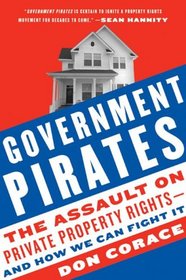Search -
Government Pirates: The Assault on Private Property Rights--and How We Can Fight It
Government Pirates The Assault on Private Property Rightsand How We Can Fight It
Author:
After years of hard work and saving, you finally own a home. But don't get too comfortable. If government officials decide they want your property, they can take it--for a wide variety of shady reasons that go far beyond the usual definition of "public purposes." The courts have allowed these injustices to persist. And there is nothing you can d... more »
Author:
After years of hard work and saving, you finally own a home. But don't get too comfortable. If government officials decide they want your property, they can take it--for a wide variety of shady reasons that go far beyond the usual definition of "public purposes." The courts have allowed these injustices to persist. And there is nothing you can d... more »
ISBN-13: 9780061661433
ISBN-10: 0061661430
Publication Date: 8/1/2008
Pages: 288
Rating: ?
ISBN-10: 0061661430
Publication Date: 8/1/2008
Pages: 288
Rating: ?
0 stars, based on 0 rating
Genres:
- Politics & Social Sciences >> Government >> Civics & Citizenship
- Nonfiction >> Politics >> Freedom & Security
- Law >> Business >> Property
- Law >> Constitutional Law
- Engineering & Transportation >> Law >> Business >> Property
- Engineering & Transportation >> Law >> Constitutional Law




